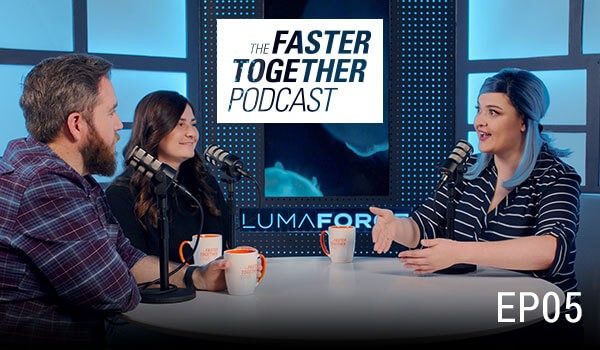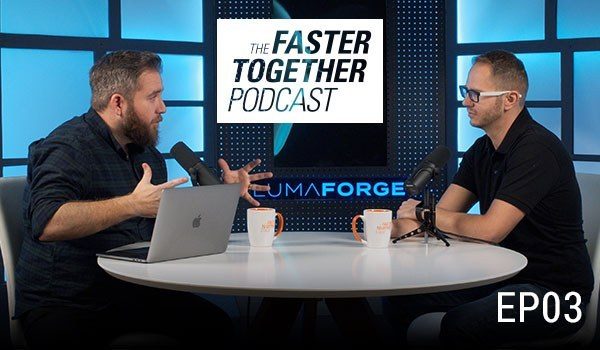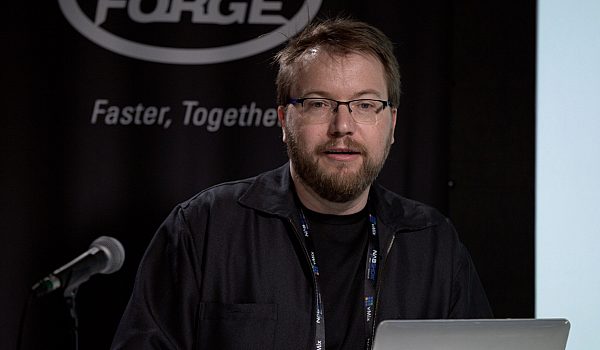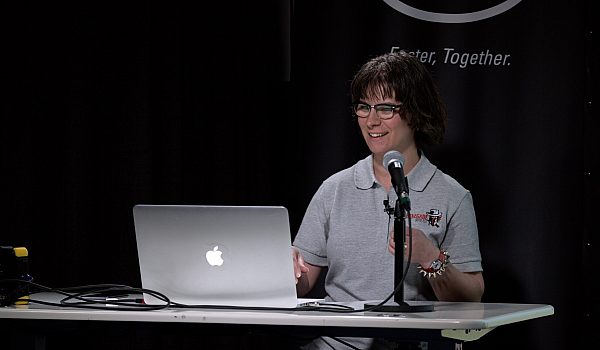Cirina Catania has encountered many creative landmines in her filmmaking career. Not only has she survived them, she has thrived. As part of the Utah Film Commission, she was a co-founder of the Sundance Film Festival. She has worked for major studios & created independent film projects.
Cirina reminds us that we all face difficulties in our careers. How can you overcome burnout, animosity, and fear? Learn how Cirina has used preparation, organization, rest, self-respect, and community to overcome creative landmines.
Don't put your life on hold. Don't wait to chase after your dreams. "A joyous life, well-lived. That is your legacy. That is what will be remembered." - Cirina Catania
- Thank you for coming so early in the morning. This is awesome. We're gonna talk today about our highway to our creative endeavors and what happens when you hit landmines. That thunder and lightening is actually from a show that I did for National Geographic called Chasing Lightening and everything that could possibly happen to us, happened on that shoot. I decided that I really don't like the name, landmines. It sounds a little bit, just doesn't sound right. So I think the first thing that we need to do when we're trying to be successful is change the way we look at things and so I've changed the subject to How to Survive Potholes on the Creative Highway. I think that's better already.
I'm a creative like you guys and I just wrestle with the left and the right side of the brain and we really need both of them to work together and to work together efficiently and joyfully so we can do our projects. There was a study done in 1968 that NASA commissioned, that showed that 98 percent of five-year-olds, test very very high on the creative scale. And then it steadily declines by the time we get to be adults, down to two percent. I don't know that that's really changed over the years. I decided to call in the experts, and ask them what they thought. That's my grandson and the reason that resonates with me is that he had no concept of forward, backward. He was just having a good time on the swing. I think that's what we need to do in our lives. Just have a good time on the swing 'cause life, you know life's kind of messy and it doesn't always do what you want it to do. A major influence of my life is my father. He is a veteran of three wars, he's my hero. He taught me a lot of what I know. He was very creative, he used to tell me stories all the time when I was a little girl. And yeah he taught me how to drive. So this highway thing, he's gonna understand.
This is one of the pictures that he took during World War II. I found out that he also worked on some of the Frank Capra films so I think maybe that's where I got some of my desire to be a warrior and to be creative. One thing my father taught me is to always look both ways before crossing an intersection in your car. This was on the, I'm filming on a ranch and there was a cattle drive going on and the other thing my dad told me that's really important is don't look just at the car in front of you. Look at the car three cars ahead and that way you'll be prepared. I think if we look towards the future, that's gonna be really important to us is to be successful in our career, so who inspires me? Well, one of the people that does, is Kionte Storey and he's the subject of my current feature, like documentary. He was raised in Stockton, California, taken away from his parents at birth, and ended up in foster care, and was finally adopted in high school, but then he joined the Marines. When he came back he had been severely injured. His left leg had to be completely rebuilt and he lost most of his right leg. Today he's climbing mountains, he's training with his wonderful service dog, he's working out and he wants to inspire people using athletics because somebody said two sentences to him when he got his first prosthetic. They said, have you done this before? And he said no, 'cause he was doing mobility exercises and running on the track. This former Olympic coach said to him, well I think you should because you're really a natural at it. And that changed his whole life. I went to Stockton and I met his adopted mom and his sister. I realized watching them that it was really love that got him through everything that he's been through in his life. So I started thinking about all of us and the creative endeavors that we have. I thought a lot of us feel alone some of the time because sometimes we're sitting in that dark room for hours and hours at a time just manipulating little pieces of media. It's a very sometimes frightening process, and we feel trapped. Sometimes we feel like we're drowning in the work and the details and the problems. I've heard so many people say, and I'm guilty of it too, I don't have time to take a break. Right? I don't have time to take a break, I'm busy. What happens when you don't take a break? It's not just you but it's all the people around you. You get gridlock, right? Sometimes you feel gridlock. This is a fun thing that I just did because I've been thinking all about this before coming to NAB to meet with you guys. This is my entry in the annual Thomas family Easter egg competition.
Eggbert sometimes could be all of us, right? We work ourselves to death and by the time we get to the finish line, we're just, they say that most people that fail in a climb, fail when they're almost to the summit. So it's really important to never lose track of what you need to get, not just to the finish line but past it so that you can stay happy. When this is happening to you, and you're feeling like Eggbert, that's when you need to stop and just pull over. Just pull over. I have a theory. I pull over, I put my feet up in the hammock and I say don't bother me. I'm working, I'm really dreaming. But dreaming is part of the work, right? I'm lucky in my life that I can do what I always dreamed I wanted to do, direct, write, produce, shoot. It's just so easy and also have fun while I'm doing it. I'd like you guys to think for a moment today while we move through this, what is your dream? What do you want? What did you want when you were five years old? And are you doing that now? I'd like you also to think about perhaps changing the dialogue that you go through. If you're afraid, try to become comfortable. Move through that fear. I shot this in a small cafe and the girl was really nervous and I talked to her and by the time I was done, she just was happy and comfortable, right? See the difference, she moved through her fear of being photographed and then was having fun with it. When people are showing animosity towards you, I have found that respect always works. Even if you don't agree with them, even if they're being terrible to you, just have some respect for them as a human being. They're probably wrong but they're still a human being.
That respect goes a long way. If somebody's being vain and bragging about what they do, have some understanding about perhaps why they're doing that. Maybe it comes from self-doubt. The kind of self-doubt that we all have occasionally. I get this a lot, I was told, you can't go to LA. I was in my late twenties at the time. You can't go to LA, you're too old, you're not a member of the union. And I say if somebody tells you you're too old, you just respond by saying, I'm ageless. I am ageless. This man, Chuck Caldwell, is a veteran Marine. I'm doing a short film on him. He's a working artist in his late eighties. If you've been hurt in your life, find love the way Kionte did through his family and through his service dog. You have to be flexible. This is actually a dinner that I had when I was shooting in the Amazon. They're called Peruvian marshmallows, and we were hungry and this is all we could get at the time and you know what? I ate 'em and they were delicious. But the most important thing I think for your both sides of your brain is find your joy. I'm not gonna go through all the numbers, I'm just putting this up here to show you that everybody says our business is dying. Box offices is down, it's really not down, it's climbing.
The projections for the next four or five years are very very healthy. There's a lot of money there so how do you find it? One of the most important ways in my life is to get organized. Try new ways of working and I'm very lucky to be partnered in a minor way with Phillip and Greg who do Lumberjack and Builder is part of that. The script on the bottom there on the left is how I used to write scripts. The window to the right is how I now do them it saves me a lot of time. This is the way I break down a story. This was the beginning of the breakdown for the Amazon shoot that I did and the equipment that I took. When I was traipsing through the jungle, half of that I had to leave in Lima and then get it when I came back 'cause we also had to shoot in Lima. You have to plan for what your story is, you have to bring all the gear to create that, and then you can start, I mean there's a lot. If you guys want a copy of this, I won't go through it all. This is only part of what you have to do as a producer to get ready for a reality television show. It's all of steps, so there's a lot there, but you can't be overwhelmed. Ask for help. Just ask for help. Find talented people, find people who want to work with you, work with them, that we make movies, crowd is awesome.
I needed to do some test shots for ZEISS and they pulled it together and came. Eric and Elena acted for me and we got, well that's my camera but we got some great sized lenses. People pitched in and helped. For a long time on the Kionte film, I didn't want to ask for help. I thought I'm gonna do everything myself and I realized I just really shouldn't. Somebody told me a long time ago, that it's amazing what you can accomplish if you're willing to share the credit. Bring other people in, make them proud of what you're doing. These are also the two people that have been very helpful to me and very supportive of my films, Phil Hodgetts and Gregory Clarke. I'm so proud of them. I have to have a shout out to them for everything they do to help me and my films.
One thing that we all get is where you work for free. It's important to help others but also help yourself too. Don't forget that you have value, that you need to be respected as well. If somebody wants you to work for free, and they're a nonprofit and they need help, go ahead and do it. But you know what? If they have a lot of money and they're spending millions of dollars or even thousands of dollars on their production and they don't want to pay you, then I would say, go swimming. Just go swimming. Whatever you do, keep traveling that highway. Kionte never gave up. He was raised in a terrible gang-infested area, he never ended up doing drugs. He went into the service, he was successful, he came back incredibly wounded but he doesn't let it get to him. He just keeps traveling that creative highway.
Through the ups and downs, in the middle of training to get on the Paralympic team, he got Crohn's and he became very very sick. So he had to take a vacation from training and it broke his heart. But three months later he was back and I was with him in Tempe and he did his personal best. You can do that too. Even when you think you can't go anymore, you can, you can, you can push yourself. There was a moment when I thought that it was the dead end for me. I lost a hundred terabytes but we got it back. In the Amazon, I went unconscious for two days. We still don't know what happened. After this wonderful shoot here, on the boat, I came back that night and two days later I wake up, and I ask my client, how long have I been out? And they said two days, I said, well oh my gosh, we gotta go shoot. So we did a night shoot. These are just some of the images of the, it's hard to see the little owl, he was adorable. It's all about life, it's about life, and how we live it, at least for me. I think it's very very important for everyone to know, don't put your life on hold, live it, and live it well.
Do whatever you can to get your story. I slept in tents for six months on the cowboy country project going all across the country. Three thousand miles, living in tents and getting potentially attacked by coyotes in that one. Find your inner warrior and be a hero for yourself, and also for others around you. They will appreciate it. You know how close I was to my father. I always wanted to make a movie about him and I never did. And I never interviewed him and I'm a film maker. So don't wait. Some of Kionte's friends are gone now too. And it's hard so I would say, this is my thought for you. A joyous life, well-lived. That's your legacy and that's what will be remembered. That's me!


 Mobile
Mobile
 Tower
Tower
 R24
R24
 Builder
Builder
 Manager
Manager
 Connect
Connect
 Kyno
Kyno
 Media Engine
Media Engine
 Remote Access
Remote Access
 Support
Support



